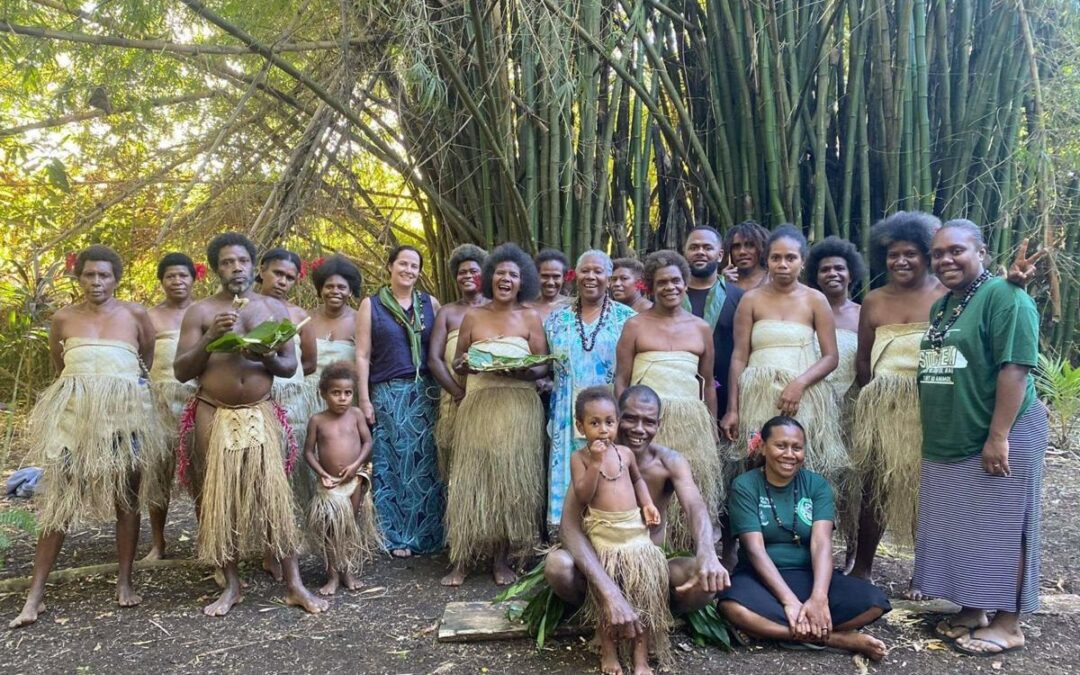The ‘Produktif Turism Blong Yumi’ team started their training, awareness, and research in Agritourism, Slow Food and Traditional local cuisine and Traditional farming systems.
The locally driven highly experienced team have developed an interactive and informative training and data collection methodology with a strong focus on more meaningful participation from our agricultural communities in tourism through the development of Agritourism experiences, while still ensuring ongoing support of the Slow Food movement through increased representation of local, organic, healthy and seasonal food and traditional cuisine in the businesses and homes throughout Vanuatu.
The key messages from the Produktif Turism Blong Yumi Initiative are at the core of understanding agritourism for Vanuatu, is that tourism is not your primary source of income, agritourism is a farm stay and/or educational tour of your farm, agribusiness or demonstration of traditional cuisine or slow food.
Agritourism for Vanuatu has the potential to rejuvenate sustainable traditional food and farming systems through greater connection between tourists (local and international), school groups etc. with our primary producers and our value adders.
The best way we can support Vanuatu and our people is to buy local and have pride in our local food.
This will take everyone to help change the story from preferring imported and unhealthy foods for the health of our nation and economy going forward.
The slow food movement is much more than just preparing food slowly and eating slowly for a long life. The National Coordinator Votausi Mackenzie-Reur suggests, “slow food means to eat local, eat in season, eat organic, it doesn’t have to take a long time to prepare, it’s about the distance the food travelled from the farm to the plate and trying to limit imported and processed foods.
Leo Vusilai our Traditional Cuisine and Slow food expert stated “slow food also doesn’t have to be a traditional recipe, it can be pasta a recipe from Italy but made with manioc flour, it’s about replacing imports with food that was grown or value added locally, I’ve presented to over thousands of people now throughout Vanuatu because I believe the power of life relies on the choices you make on your plate, this approach under the ‘produktif turism blong yumi’ is the right approach”.
Victoria Witias from Selmolo village stated “I’ve been planting and planting local food and I sell it to other bungalows but I actually don’t know how to cook it properly and I did not know it could taste so good, I’m so grateful to Leonid Vusali and the agritourism team for coming to our community”.
Daniel Quarang from Hanare Custom Village stated, “this is the first time I have had support for agritourism from the Government and I’m so grateful, our community has a clear plan and understanding now of how to go forward in developing agritourism experiences”.
The team have visited communities in Ambae, Maewo, West Coast Santo, East Coast Santo, Luganville, Port Vila, Gaua, Vanuau Lava, Mota Lava, Malekula and Ambrym. The team will continue on building this message with travel planned to Tanna later in the month.
We encourage everyone to follow our Vanuatu Agritourism Association Facebook page and help spread the positive messages to support agritourism, slow food and traditional local cuisine and farming systems.
Formal elections were held for the Vanuatu Agritourism Association at Hideaway in East Coast Santo.
Benson Samuel was elected as President, Kalo Natheniel Vice President, Julia King as treasurer, Susan Garae as Secretary, and Hutchinson Mumeg, Daniel Quarang, Caroline Earnst, and Karen Phung as executive members.
The Vanuatu Agritourism Association made up of 27 Agritourism operators throughout the 6 Provinces that have gone through the agritourism training worked with the agritourism team to develop standards and criteria for membership of the association stating criteria such as the agritourism business must provide an educational experience promoting Vanuatu’s productive sector and value-added products.
Criteria was also developed around businesses using organic local food, local products such as soap, handicrafts, textiles etc, sustainable farming and businesses and supporting each other’s businesses instead of seeing each other as competitors.
The Director of Tourism, Jerry Spooner stated, “An important reminder for our agritourism ambassadors is that this is the pilot phase of this project with a very new approach.
“As we further develop our approach, we will bring more agritourism ambassadors along for the journey as part of our niufala rod blong turism.”
Mia Ramon from SPC congratulated the newly formed Vanuatu Agritourism Association and suggested SPC is willing to provide mentoring support in the future.
Warren Gamma from the Vanuatu Skills Partnership stated “the agritourism value chain is a really great example to show how we can connect all the dots to better support Vanuatu’s productive and tourism sector through partnerships”.
The agritourism project team would like to thank the Government of Vanuatu, New Zealand Ministry of Foreign Affairs and Trade, European Development Fund, the Integrated Sustainable Land and Coastal Management Project for their work in registering water taro gardens as Globally Important Agriculture Heritage Systems (GIAHS), Pacific Island Food Revolution, and the Australian Centre for International Agricultural Research through the Pacific Agricultural Research for Development Initiative (PARDI 2).




